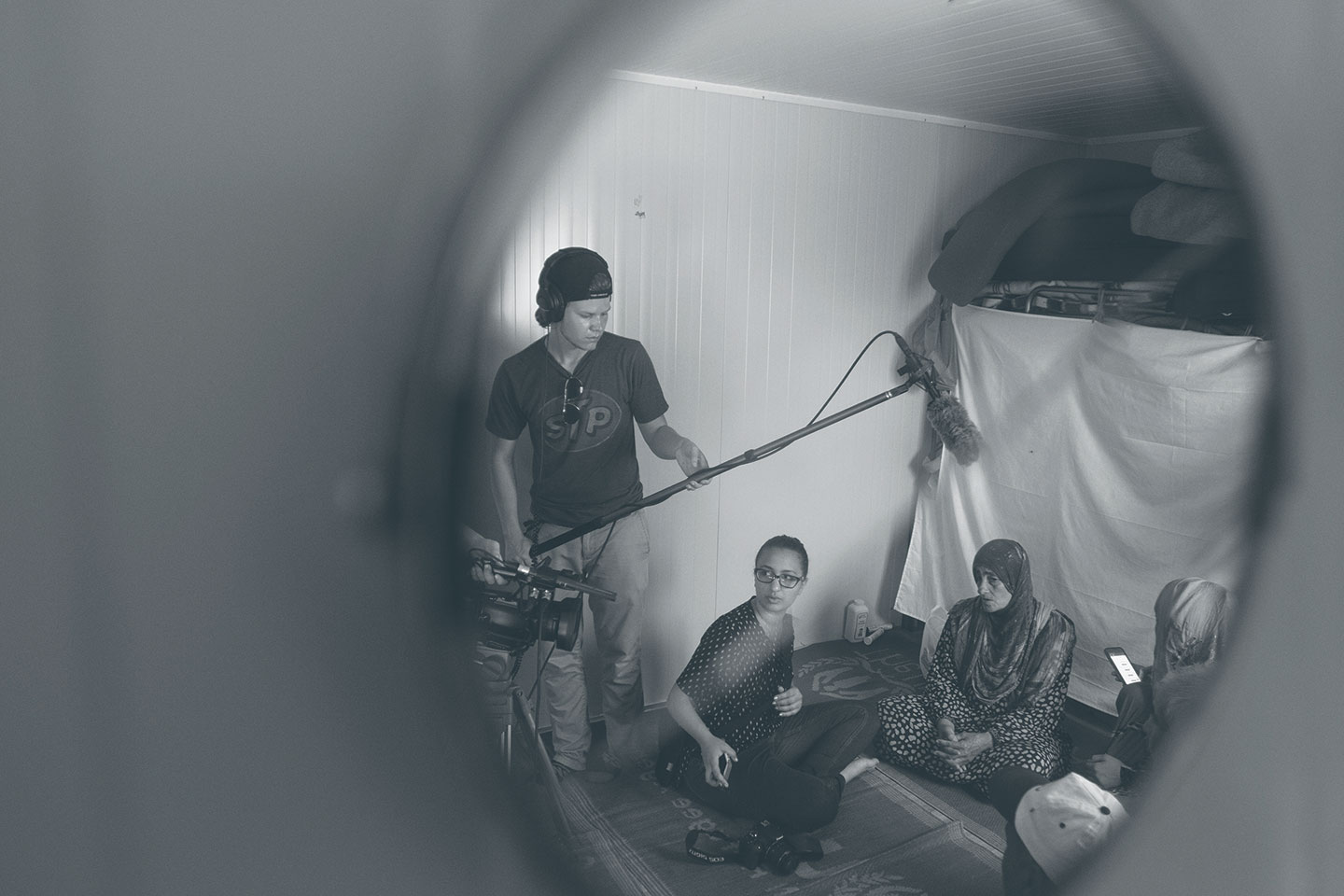
Looking for Home
Students travel to Greece to film the human stories of the refugee crisis
Students Shawn Latham and Nadia Abbas interview a refugee family from Syria inside the family’s trailer at the Kara Tepe camp in Lesbos. Photos by Thomas E. Franklin
From a beach on the Greek island of Lesbos, Turkey appears as a short and scenic boat ride away. Yet for the hundreds of thousands of asylum seekers from Syria and other war-torn countries, the Aegean Sea passage between the two nations is a perilous “route of death.” For those who manage to survive the crossing in ill-equipped inflatable rubber dinghies, Lesbos has become a gateway to new homes in Europe.
This summer, a team of five students joined School of Communication and Media professors Steve McCarthy, David Sanders and Thomas Franklin on a 10-day journey to Greece where they shot videos focused on the island’s refugees. “The Syrian refugee crisis is one of the major stories of our lifetime,” says Franklin. “This was a very rich experience and great opportunity for the students and for us.
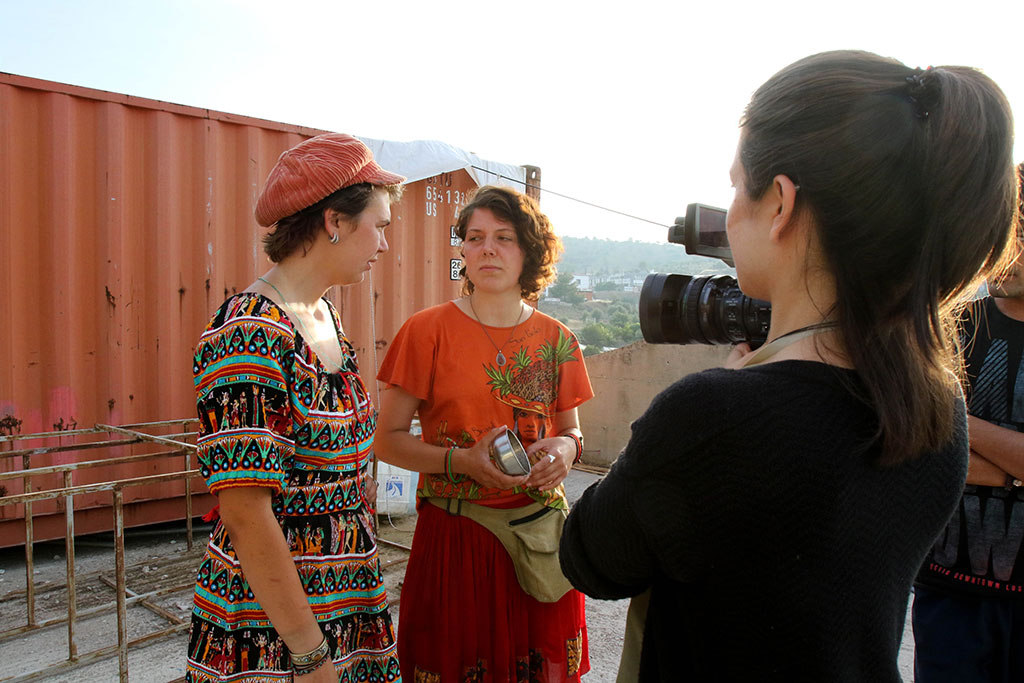
The professors had each received awards from the University’s Office of International Engagement to defray travel expenses. Franklin, a photojournalist, joined colleagues Sanders and McCarthy who have taken students abroad to film in such countries as Tunisia and Austria in the past.
Acting as executive producers, the professors met well in advance of the early summer trip with their student producers who pitched stories and reached out to location sources and government officials – through social media and email – to schedule location shoots for individual five-minute videos.
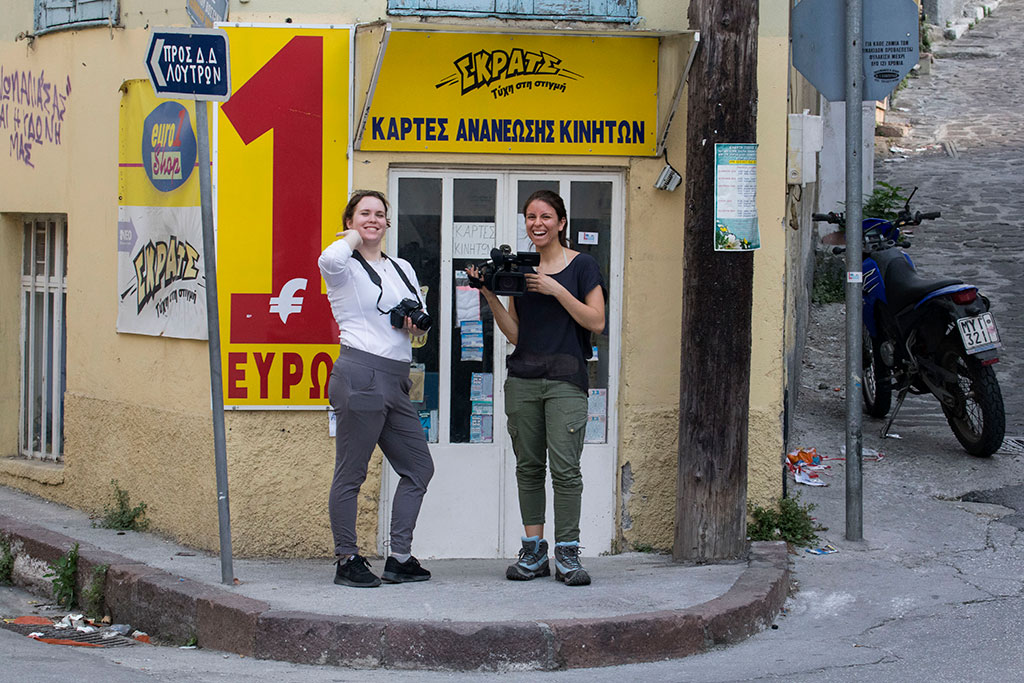
Filmmaking boot camp
The trip was a far cry from an idyllic summer vacation on a legendary Greek isle. “We run this like a boot camp,” says McCarthy, an Emmy Award–winning producer. “We start early and shoot every day. It’s a steep learning curve of how to shoot in the field – I squeeze into a week what I can teach in half a semester. One thing that amazed me is that these students didn’t know each other ahead of time. Yet there was no drama. Once on the ground, they worked as a team.”
Franklin was impressed by the students’ work as documentarians. “They were very sensitive in interviewing refugee families who had arrived in Greece in inflatable boats after leaving everything behind in Syria,” he says. “These families had risked everything to seek better lives for themselves and their families. I was proud of our students, who stepped up to the plate as professionals.”
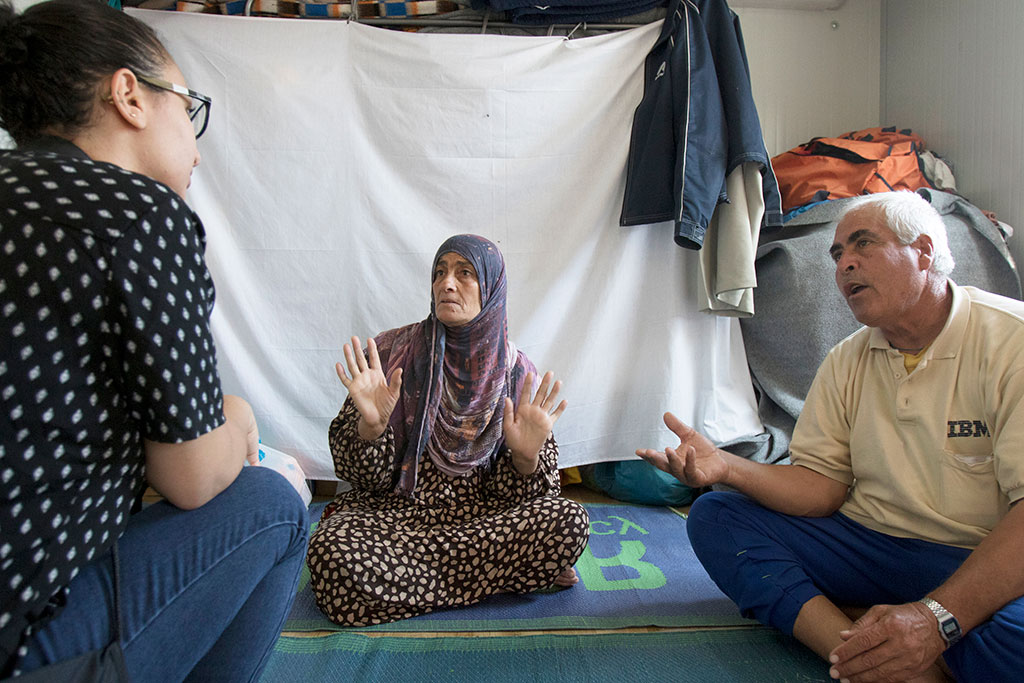
For senior Shawn Latham, the trip was transformative. “It was a culture shock for me in the most positive sense,” he recalls.
A Television and Digital Media major who is concentrating in Audio/Sound Design, Latham was initially uncertain as to whether the trip would be a good fit. “As a tech and operations guy, I was thinking it might not be my forte,” he says. “But I saw a great opportunity to learn more about the challenges of shooting on location in a foreign country – from scheduling interviews with people to crafting a story out of the experience. I realized I’d have to go out of my comfort zone to get experience like this.”
Latham had arranged ahead of time to film at the One Happy Family Community Center near the island’s city of Mytilene. Affiliated with Swiss Cross Help, the Center offers refugees activities and assistance – from clothing and language classes to internet access and food.
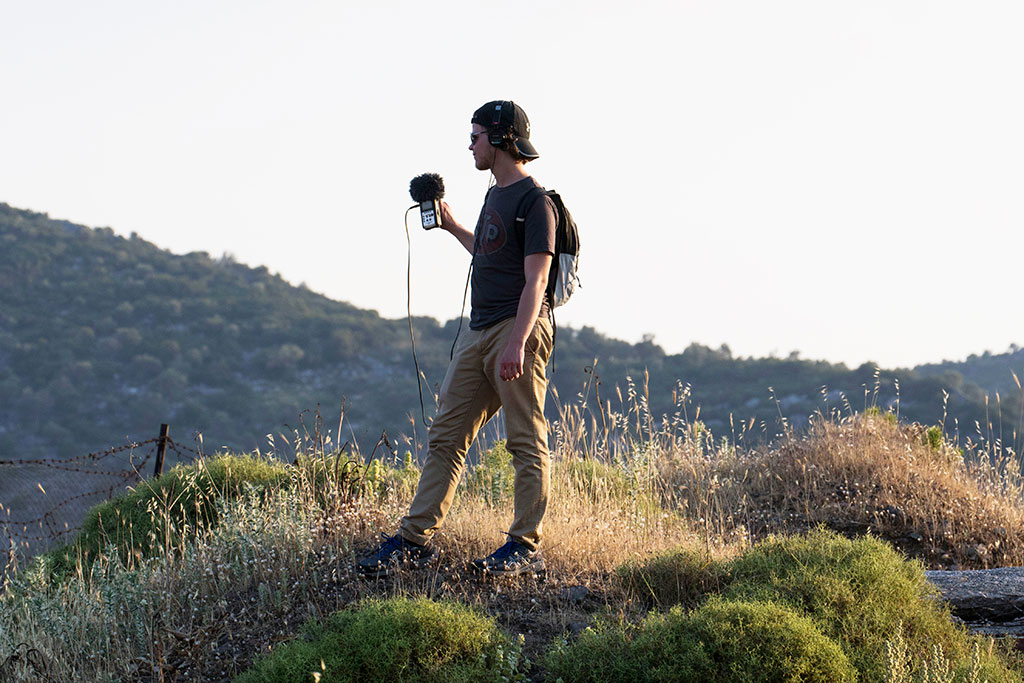
When the team arrived to film there, Latham noticed that three Pakistani brothers had started up a radio station at the Center. “The brothers were pretty much running the station by themselves,” Latham remembers. “They interviewed fellow refugees, played music from different cultures and served as a community conversation access point. I thought this was an innovative way to bring a community of strangers together and create a welcoming and prideful atmosphere.”
I’d read a lot about the Syrian refugee situation, but it didn’t feel real to me. But when I went there, reality smacked me so hard. I learned so much and grew so much as a person.
Because he is an audio guy, Latham switched gears and began making a short documentary about the radio station, interviewing Swiss Cross organizers and one of the brothers, who shared the story of his journey to Lesbos. Besides filming his own video, Latham captured the audio for his team members’ interviews. “I was mainly the guy with the headphones on who was carrying the microphone for most of the trip,” he explains.
Latham will forever remember the unexpected generosity of the people of Lesbos. One day, while filming on a relatively deserted part of the island, a boy from a nearby house approached the team with a bowl of cherries. Latham recalls the moment as a “small gesture of friendship to complete strangers that you don’t see everywhere.”
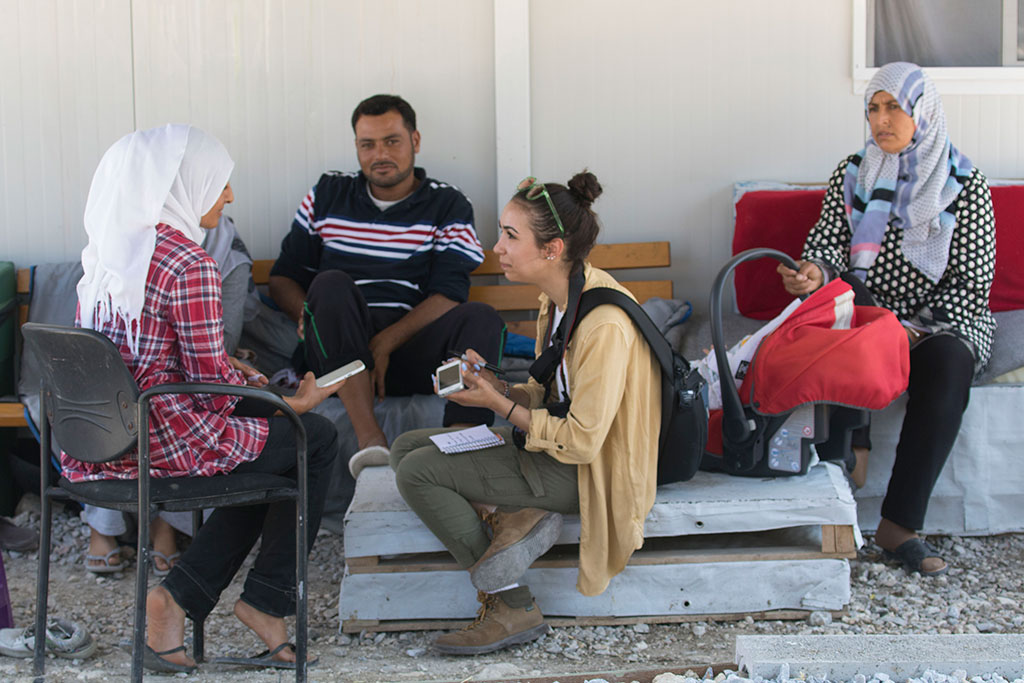
While Latham returned home feeling connected to world events like the refugee crisis, he believes that it is just as important to know the human toll of the events. “Most of the time we get sensationalized stories, not the human stories. You have to sift through to find the stories of the people who are trying their best in the face of adversity who are helping others,” he says.
English and journalism major Danielle Weidner agrees that the people she met – and the stories they shared – left an indelible impression. “We all really connected with people who are completely culturally different from us, but who were so kind and loving,” she says. “I think when it comes down to it, we’re all human beings connecting on the same playing field.”
While in Greece, Thomas Franklin produced his own short film, The World Arrived on Our Doorstep, about a British couple who have helped thousands of refugees on Lesbos. The film has aired on i24news.tv.
She interviewed a director of Movement on the Ground, a nonprofit organization based in the Kara Tepe refugee camp on Lesbos. “Movement on the Ground is trying to create an environment where people can come together and forget what they’ve been through – or at least cope with it and move on in a healthy way.”
Weidner also interviewed an Afghan refugee at One Happy Family, whose harrowing story will always stick with her. The young man had fled Afghanistan after his brother produced TV bits that mocked the government. After being assaulted by police in Turkey, he finally reached Greece, where local residents initially berated and insulted him. “I broke down and started crying in the middle of his story. I’ll never forget that moment,” she says, ”because we just stared at each other and shared a moment of silence.”
Now that she is back on campus, Weidner plans to volunteer with Movement on the Ground, or a similar organization, in the future. “I’d read a lot about the Syrian refugee situation, but it didn’t feel real to me. But when I went there, reality smacked me so hard. I learned so much and grew so much as a person,” she says. “I realized things that I couldn’t even imagine were happening all over the globe – and I realized how good I have it here at home.”
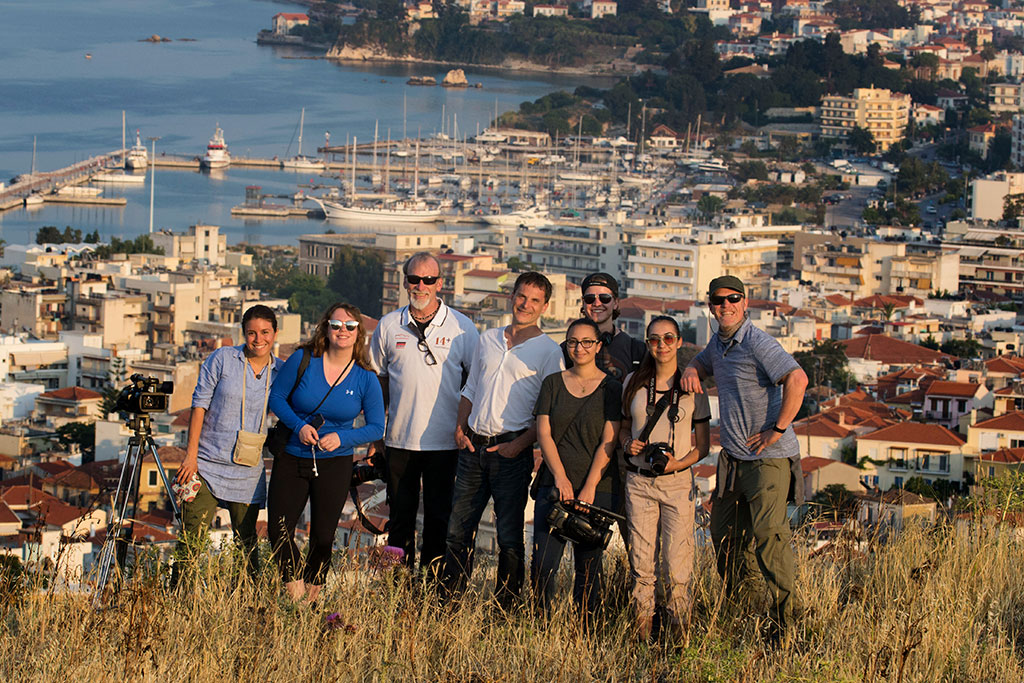
Making human connections
“At some level, everyone is the same, no matter the situation. The important thing is to make that human connection,” says Sanders, who was impressed at how readily and genuinely the students connected with refugees. Even on their first day on Lesbos, where they were left waiting outside the gates of the Kara Tepe camp for hours, despite advance promises of entry, they didn’t hesitate to reach out to refugees who were coming in and out of the camp.
“The next day, as the officials were still back-pedaling and delaying our entry, two of the refugee families the students had talked to came up and greeted them. Once the officials saw that a relationship already existed with refugees who were willing to be filmed, they let us in,” Sanders says. “They learned firsthand that when things don’t go as planned, you can’t just shrug and throw up your hands. You need a Plan B, C and D.”